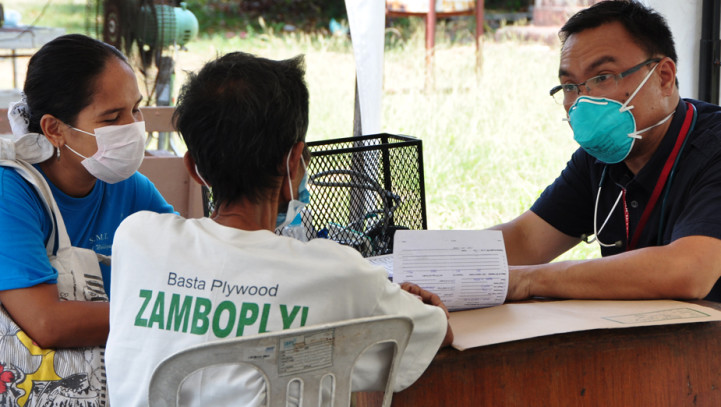IN CELEBRATION OF LUNG MONTH DOH brings TB awareness caravan to the regions

Happy to give back. Less than a week after she was declared cured of multi-drug resistant TB, Maricel Buen, 38, started volunteering full-time at the Lung Center of the Philippines to give back and help current patients complete their treatment. Authorities estimate that 290,000 new cases of TB develop every year in the Philippines.
Joan, 35, of Caloocan City had been coughing for more than a month and had lost appetite over the days – but she just dismissed it as regular cough and blamed it on stress from street vending.
Until she coughed blood. She consulted with a doctor in the health center and found out she had tuberculosis, for which she immediately enrolled in the Directly Observed Treatment Short course (DOTS).
But it was too late, as his two sons with whom she shares their poorly ventilated house had already acquired the airborne disease.
With the doctor’s instructions and Joan’s swift action to have herself and her sons treated for TB, they were all cured after six months of daily health center visits to take their medicines. Armed with new knowledge and coming from a life-threatening experience, Joan and her family now observe a healthier lifestyle.
But there are many others like Joan who dismiss symptoms of TB (2 weeks of coughing, loss of appetite, chest pains and weight loss) as nothing more than a regular cough, contributing to continued incidence and stigma of the airborne but curable disease.
This August, the Department of Health Regional Offices will be on the road to reach the Joans in target areas and promote TB consciousness as the nation observes Lung Month.
BRINGING TB AWARENESS TO THE REGIONS
Lung Month is a national observance held every August to “focus the public’s attention
on the pulmonary system and illnesses of the lungs and urge everyone to contribute to a better and healthier environment.”
Concurrently observed is the National Tuberculosis Awareness Month to promote the importance of early diagnosis and treatment for TB, a disease that mostly affects the lungs.
To intensify the drive for TB awareness, DOH will be conducting a series of regional TB lectures and caravans in target areas and communities this month.
The TB caravans, supported by the Global Fund to Fight AIDS, Tuberculosis and Malaria through the Philippines Business for Social Progress, is expected to reach 5,000 participants nationwide. It aims to reach individuals who would not normally visit health centers during regular TB consultation days and intensify the search for TB cases in the community.
Participating DOH regional offices are Ilocos (1), CALABARZON (4-A), MIMAROPA (4-B), Bicol (5), Central Visayas (7), Eastern Visayas (8), Western Mindanao (9) and Northern Mindanao (10).
The TB caravan will be brought to the following areas: Pagsanghan, Samar (Aug 3);Siruma, Camarines Sur (Aug 18); Oslob, Cebu (Aug 25); Naga City, Cebu (Aug 26); Tuburan City, Cebu (Aug 27); Zamboanga City (Aug 30-31).
Region 1 has already conducted their TB caravan in June and Regions 4-A, 4-B and 10 will conduct their caravan after August.
TB IN THE PHILIPPINES
TB, a disease spread mainly from coughing or spitting by a person with TB bacteria, remains the deadliest treatable disease in the world. In the Philippines, it kills 28,000 Filipinos every year, ranking TB as the sixth leading cause of death. The country also ranks 9th of 22 high TB burden countries worldwide.
Since the country adopted DOTS – a tuberculosis control strategy recommended by the World Health Organization – in 1996, death due to TB has declined from 55 in every 100,000 Filipinos in 1990 to 24 in 2012.
However, incidence of TB has been constant in recent years, with 290,000 new cases developing every year. A more extreme form of TB – multidrug resistant TB (MDRTB) – has also been on the rise mainly due to interruption of the six-month treatment for regular TB.
To reach the ultimate goal of a TB-free Philippines, DOH and its partners have intensified search of TB cases, strengthened health systems and logistics management and expanded TB services.DOTS services are available and free in rural and city health units nationwide. Diagnosis and treatment for MDRTB are also available and free in select facilities in every region.
AIDERS (Accelerating Implementation of DOTS Enhancements to Reach Special Populations), are nurses that have also been hired and deployed by the DOH Regional Offices in geographically isolated and disadvantaged areas to conduct TB awareness activities and specifically to look for presumptive TB cases. But all these efforts won’t lead to a TB-free Philippines without the vigilance and support of everyone. A person coughing for two weeks should go to health centers and consult a doctor. As in any other disease, worst forms of TB can be prevented through early detection and proper treatment.









